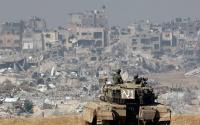www.commondreams.org/headline/2009/01/04-0
by Ian Munro
5 January 2009
NEW YORK - In an extraordinary outburst, the president of the United Nations General Assembly has branded Israel's ground offensive in Gaza a "monstrosity" and a marked failure for the UN.
Miguel d'Escoto Brockmann, of Nicaragua, blasted the Israeli action on Saturday as the UN Security Council convened its third Gaza emergency session.
"I think it's a monstrosity; there's no other way to name it," Mr Brockmann said. "Once again, the world is watching in dismay the dysfunctionality of the Security Council."
His remarks were seen as putting a slight upon the United States, which again prevented the council from issuing an agreed statement on the crisis.
The UN Secretary-General, Ban Ki-moon, lamented Israel's incursion after a week-long bombardment of Gaza that had already killed at least 460 people and injured thousands more.
Israel has said it is targeting Hamas militants and resources, but according to early estimates about one quarter of those killed were civilians.
Mr Ban had expressed his extreme disappointment to the Israeli Prime Minister, Ehud Olmert, and had called for an immediate end to the ground operation, his spokesman said.
The Security Council failed to reach agreement on the Israeli action because the US again blocked consensus during the late-night emergency meeting.
Hamas must stop smuggling arms into Gaza and cease its rocket attacks on Israel, which were the "root cause" of violence in the region, said the deputy permanent representative for the US, Alejandro Wolff.
Mr Wolff said there was no point in the Security Council issuing a statement that Hamas would not honour. "We are not going to equate the actions of Israel, a member state of the United Nations, with the actions of the terrorist group Hamas. There is no equivalence there."
Asked his reaction to Mr Brockmann's criticism of the Security Council, Mr Wolff said: "I would urge him to focus on the dysfunctionality of other parts of this organisation."
Mr Wolff said the plight of the Palestinian people in Gaza was directly attributable to Hamas. "The problems the civilians are facing in Gaza are a function of how Hamas operates. It's a very densely populated area [with] Hamas deliberately melding into the population."
Israel began amassing troops and armoured vehicles on its border with the Gaza Strip days into the bombardment. Since last Monday UN officials have expressed fears about the impact of a land invasion.
Gaza has limited power and is reliant on Israeli co-operation for emergency supplies of medicines, food and fuel.
The UN has repeatedly called for a ceasefire but to no effect. Israel has continued to target Hamas militants in the territory, and Hamas has persisted with rocket attacks on cities in southern Israel.
Since the conflict began nine days ago the UN has accused Israel of a disproportionate response to the attacks and of breaching international law with its blockade, which it said punishes the mainly civilian population.
The UN spokesman for Mr Ban said he had told Mr Olmert the ground invasion would only intensify the suffering of Gaza's 1.5 million civilians.
The UN has not been alone in trying to broker a ceasefire; attempts by the European Union, the US and Russia have failed too.
The invasion began just hours after the EU announced it was sending a delegation to try to negotiate a ceasefire.
The French Foreign Minister, Bernard Kouchner, said the decision to send ground forces into Gaza was a "dangerous military escalation".
The US Department of State said any ceasefire must not allow a return to the status quo. "We are working towards a ceasefire that would not allow a re-establishment of the status quo ante, where Hamas can continue to launch rockets out of Gaza and to condemn the people of Gaza to a life of misery," a departmental spokesman said.






